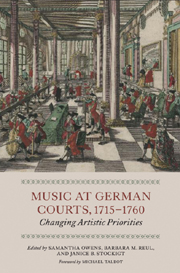Book contents
- Frontmatter
- Contents
- List of Tables
- Foreword
- Preface
- Editorial Notes
- Notes on Contributors
- List of Abbreviations
- 1 ‘Das gantze Corpus derer musicirenden Personen’: An Introduction to German Hofkapellen
- KINGDOMS AND ELECTORATES
- 2 The Court of Saxony-Dresden
- 3 The Saxon Court of the Kingdom of Poland
- 4 The Court of Brandenburg-Prussia
- 5 The Palatine Court in Mannheim
- DUCHIES
- PRINCIPALITIES AND PRINCE-BISHOPRICS
- LANDGRAVIATES AND MARGRAVIATES
- Index
3 - The Saxon Court of the Kingdom of Poland
from KINGDOMS AND ELECTORATES
Published online by Cambridge University Press: 12 September 2012
- Frontmatter
- Contents
- List of Tables
- Foreword
- Preface
- Editorial Notes
- Notes on Contributors
- List of Abbreviations
- 1 ‘Das gantze Corpus derer musicirenden Personen’: An Introduction to German Hofkapellen
- KINGDOMS AND ELECTORATES
- 2 The Court of Saxony-Dresden
- 3 The Saxon Court of the Kingdom of Poland
- 4 The Court of Brandenburg-Prussia
- 5 The Palatine Court in Mannheim
- DUCHIES
- PRINCIPALITIES AND PRINCE-BISHOPRICS
- LANDGRAVIATES AND MARGRAVIATES
- Index
Summary
FROM 1573 ONWARDS, the rulers of the Polish–Lithuanian real union (the kingdom of Poland and the grand duchy of Lithuania) were appointed in elections. Each monarch's court would become dissolved upon the king's death, and the royal collections of art, books, and music were handed down to the king's heirs. As a result, a new monarch had to organize a new court and accumulate new collections; on the other hand, he would typically inherit from his predecessor some of the personnel, including musicians. This was the case with the two Saxon electors, Friedrich August I (also known as August the Strong) and his son, Friedrich August II. Both became kings of Poland and grand dukes of Lithuania, and as such they were known as August II (1697–1706 and 1709–33) and August III (1733–63), respectively. After their respective deaths, most of the records and all of their music collections previously held in Warsaw were removed to Dresden and incorporated into its collections. It is therefore difficult to neatly pinpoint those works composed for, or performed at, the Polish court among the many music scores in the Dresden royal-electoral collections.
In any case, the situation that resulted from the Polish(/Lithuanian)–Saxon personal union was rather peculiar. Each of the two Augusts had to simultaneously retain two separate state structures that were markedly different in terms of size, ethnic composition, religion, political system, economic development, and culture.
- Type
- Chapter
- Information
- Music at German Courts, 1715–1760Changing Artistic Priorities, pp. 51 - 78Publisher: Boydell & BrewerPrint publication year: 2011



